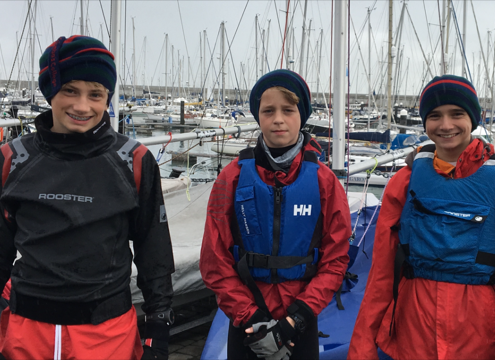Eliza Somerville from Fourth Form reviews the recent TY House Speech evening:
An evening full of captivating speeches began with a talk about concussion from Thady McKeever. He spoke about the dangers of contact sports, and the effects of repeated concussion on the brain. He ended his speech with a thought-provoking anecdote about an American football player, who ultimately died as a result of his eighteen-year career in professional sports.
I thought that this speech was very engaging. It began with a strong metaphor of your worst enemy hitting you with a bowling ball, and it was shocking to learn that this is equivalent to the force of a boxer’s fist. I also thought that the story about Mike Webster at the end of the speech was very powerful, as it showed the real-life effects of contact sports on the brain and body.
Next, Frances Wilkinson told us about the Butterfly Effect. She explained how small events can have huge, unforeseen consequences. For example, a butterfly flapping its wings could eventually create a tornado. She used an example of a man who spared the life of a soldier in World War I. This soldier turned out to be Adolf Hitler, who was responsible for millions of deaths in World War II.
I found this speech very interesting, as I was curious about how large an effect a small change could truly have. From the examples Frances used, I realised that even the smallest of actions can change the course of history.
Alexis Haarmann then told us about the controversy surrounding the death penalty. He explained that five per cent of people who are sentenced to death turn out to be innocent, and pointed out that waiting for the death penalty to be carried out is mental torture even for rightfully convicted criminals. I thought that this speech gave me a good background to the death penalty, and it made me more convinced that it should be abolished everywhere.
Ben Upton then outlined each side of the argument on whether marijuana should be legal or not. He explored both the recreational and the medicinal side of marijuana, explaining how the legalisation of marijuana would benefit the economy, and how people who experience seizures can benefit greatly from the use of medicinal marijuana. He eventually came to the conclusion that marijuana should not be legalised, as it just causes people to drift further and further away from reality. This speech was well-researched and it was an interesting view on the controversial topic of marijuana’s legalisation.
This was followed by an impressive speech from Tania Stokes on climate change. She first acknowledged that thinking of global issues can be daunting, and then emphasised that even one person changing their behaviour can have an effect on global issues. She then told us some simple tips on how we can reduce our own carbon emissions and waste. Tania ended her speech by telling us to imagine the most beautiful place we’d ever been to, destroyed forever because of climate change.
Tania’s speech stood out to me as she clearly knew her topic very well, and she was truly passionate about environmental issues. I thought that her ending, where she told people to visualise an amazing place, gone forever, was very strong, as it emphasised the shocking influence climate change could have on our world over the next hundred years.
Next, Andrew Kim gave a speech about transport. He pointed out that, four hundred years ago, people had to walk everywhere, or if they were lucky they had a horse. He described the efficiency of the transport system in South Korea, where they have a single card for all modes of transport. Andrew then went on to talk about the various improvements in transport in recent years, such as self-driving cars and the Hyperloop.
Andrew presented what could have been a dull topic in an engaging way, showing how our lives would be drastically altered if modern transport did not exist. I also found the modern advancements in transport fascinating.
Sam Lawrence then gave an absorbing speech about conservation. He informed us about the issues caused by our over-consumption of products such as palm oil. Deforestation of palm trees is occurring at an alarming rate, as fifty per cent of all products in an average supermarket contain palm oil. Sam covered many important issues in his speech, and showed how vital it is to conserve our planet’s resources.
Afterwards, Sophia Cabo spoke about divorce. In her speech, she drew from personal experience to paint a stirring picture of what it is like to go through the divorce of your parents at a young age. Sophia said that there are three stages to divorce: sadness, anger and happiness, and revealed that she was finally in the happy stage.
In her speech, Sophia showed a side of divorce that many people do not get to see. I thought that she described her journey through a difficult time very effectively.
Killian Morrell then talked about the Beatles. He said that his dad was a fan of the band, so Killian had grown up listening to their music. He added that now, when he listens to their music, he instantly gets nostalgic because it reminds him of his childhood in Dubai. Killian’s speech was unusual, and it gave an interesting picture of the different musical influences in his life.
Finally, Sophia Cole talked about women in sport. She said that recently, people have begun to see that women should not work solely in the home, as they have a lot more to offer. However, she explained that there is still huge inequality between men and women’s sport. For example, men get paid a lot more money for playing the same sport as women, and often get to play in drastically better venues than women.
Sophia raised some interesting points, and her speech was both clear and coherent. It was shameful to hear some of the inequality women still experience in the world of sport today.
At the end of the evening, I thought that the joint winners, Thady McKeever and Tania Stokes, were well-deserving of the prize as their speeches were both compelling and thought-provoking, and they each approached their topics with striking originality.




















